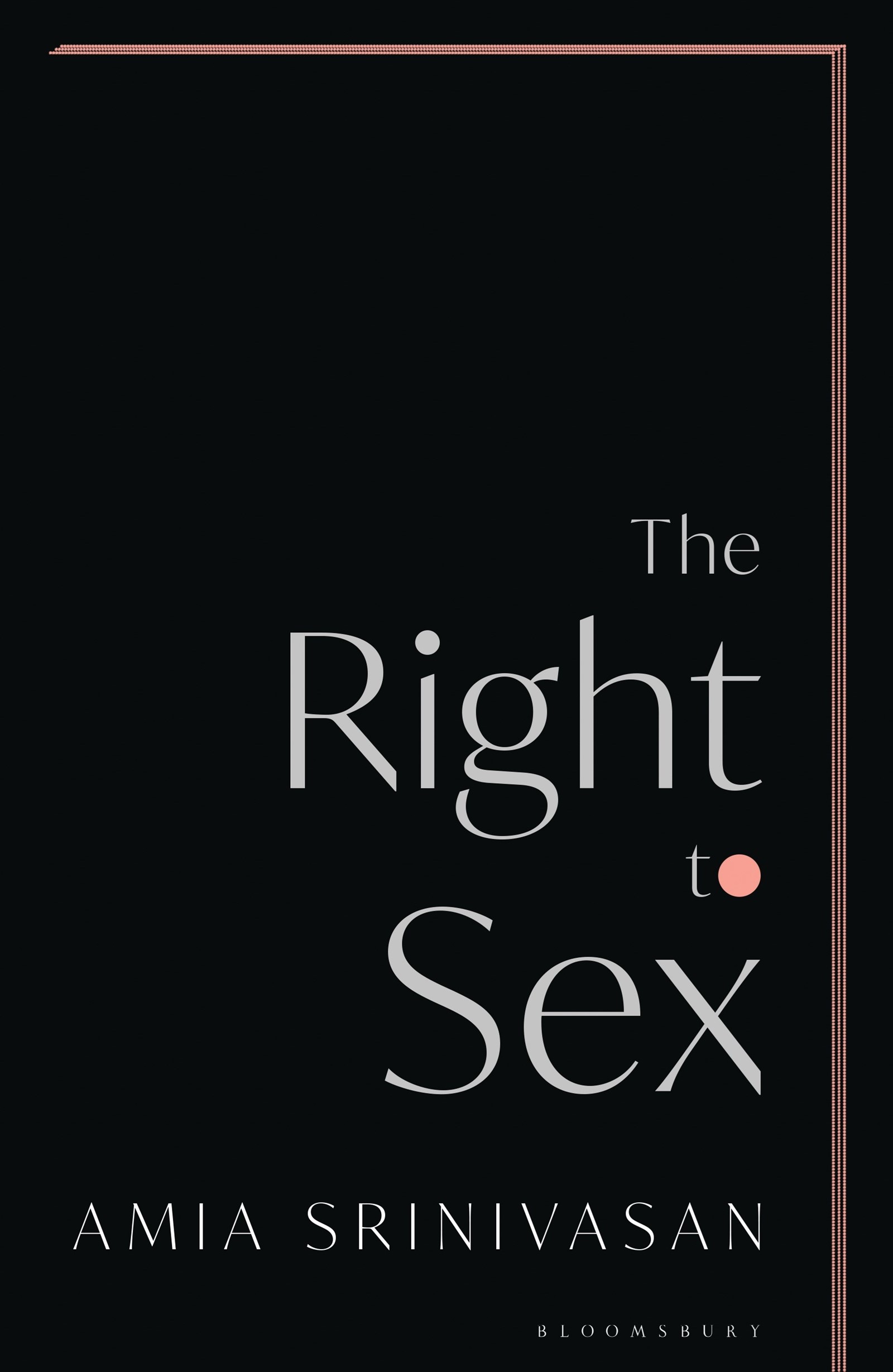There has been an outpouring of “feminist” literature in the last decade. It’s easy, after a while, for these texts to sludge together in your mind, forming a pastel-pink swirl of politicised hashtags, confessional essays and corporate truisms. The conversations, once inspiring, grow repetitive; the ideas, once radical, become derivative (or co-opted by environmentally destructive soap brands).
But then someone like Amia Srinivasan comes along. The US-born philosopher’s first non-fiction book, The Right To Sex, has cut through the stale slush of contemporary feminism, making space for a bolder, more discomfiting critical conversation. It is essentially a study of sex as a political phenomenon – and the questions Srinivasan wields are challenging, but handled with immaculate care. Who, she asks, do we truly deem “fuckable” and why? How influenced are our desires by our political structures? In more controversial moments, Srinivasan probes previously untouchable areas (at least from a leftist perspective), exploring the problems with porn, consent and sex-positivity, as well as the failings of the #MeToo and #BelieveHer movements.
The Right To Sex is divisive. But Srinivasan – who is a Professor of Social and Political Theory at the University of Oxford – welcomes any debates the text could spark. “I’m very happy to be disagreed with, I’m sure I’ve got a lot wrong,” she says, warmly (we are speaking over the phone from her home in Oxford, days before the book’s release). “What‘s wonderful is that there is still a reading public who are good, subtle readers, who are very happy to follow the ins and outs of a complex argument and decide what to make of it themselves.” As the book hits shelves in the UK, she spoke in more detail about the text’s most contentious moments and the ideas that inspired them.

Dominique Sisley: Why did you want to write this book now? What kind of conversations did you want to instigate?
Amia Srinivasan: I wanted to rejuvenate the conversation about sex as a political phenomenon. We’re used to thinking of sex as a private concern, and we are justifiably wary of the state intruding into citizen’s private sexual interactions. That in itself is a hard-won result of politics: LGBTQ activists had to fight very hard to protect the rights of people with marginalised sexualities, to let them be able to conduct their sex lives consensually as they please. But I also think that there’s just been a general withering away of our ability to talk about sex as a complex political phenomenon. Often, we just end up reaching for ideas like consent: so if there’s something problematic about sex, it must be non-consensual.
DS: Our current fixation on consent, has that come from the #MeToo movement?
AS: I think it predates #MeToo. Historically, in many countries, the crime of rape or sexual assault has been defined in terms of physical force. Of course, that failed to capture the countless victims of sexual assault who were coerced into sex in non-physical ways. In the 70s, feminists had to fight very hard to make the absence of consent, rather than force, the determining condition of sexual assault. It was a very important legal shift, but as a result, our general public conversations about sex often just focus monomaniacally on consent as the only useful paradigm for thinking about sexual ethics or sexual politics. #MeToo has certainly underscored that, and it’s also shown us the limits of the usefulness of consent talk. Sometimes what people are expressing objection to isn’t non-consensual sex, it’s sex that’s problematic for some other reason. For example, I think women – and men – can consent to sex when they don’t really want it, but they feel it’s expected of them. In those cases, the sex may very well be consensual, but there’s still something problematic going on.
“I think each of us contains dissident desires that cut against politics – the history of queer sexuality shows us that. It’s desire rebelling against what politics has chosen for people” – Amia Srinivasan
DS: You imply that this fixation on consent is an effect of the capitalist mindset, and compare the norms of sex to “the norms of capitalist free exchange”. I’m interested in the idea that capitalism is changing sex, and the way we view sex, in all these strange and subtle ways.
A: Yeah, that’s a very central preoccupation of mine. I think that the logic of the marketplace infects how we think and talk about sex. For example, the idea of consent presupposes a contract: someone is asking to do something to you, and they have to get permission to do it. But think about what it’s like when you spend time with your best friend. How often do you ask for your best friend’s consent to comfort them when they’re upset? You don’t have to, because you already have a relationship of mutuality, where you are sensitive to each other’s wants and needs. You don’t want to do anything to your friend that they don’t want, and therefore have to consent to. The consent model presumes an oppositional relationship [between sexual partners], where you have a buyer and seller. There are also structural forces that make certain kinds of people more likely to seek permission, and others more likely to be the ones who grant it. Why is that? It’s the same in the labour market – why is it that certain people need to sell their labour, and certain people don’t? What kind of inequalities structure the giving and asking of consent?
Ultimately, I think sex shouldn’t be thought of in a market framework at all. Sex also shouldn’t be thought of as a status, which is how we often think about it. Incels, for example, talk about themselves as if they’re deprived of sex, but what they are really upset about, in my view, is that they don’t have a high sexual status. They aren’t able to attract the sort of women [“hot blonde sluts”] that could confer status onto them. The whole thing is messed up.
DS: What about dating apps? What role do they play in this sexual marketplace?
AS: I have mixed feelings about them. I think that dating apps and hookup apps can be really empowering, especially for people who have marginalised sexualities or gender identities, so I really don’t want to undersell their value. At the same time, I do think that these apps inadvertently end up institutionalising some of what’s ugliest about our sexual politics onto the screen. Take Grindr as an example, and the way in which many gay men will just very boldly state their racialised sexual preferences. They will say that they aren’t interested in Asian or south Asian men [“no rice, no spice”], or that they’re only interested in east Asian men because they’re fetishising them in some particular way. That’s a clear case in which, again, this sexual hierarchy – and specifically the racialised nature of that sexual hierarchy – is shaping who is and isn’t considered desirable or worthy of sexual desire.
DS: If our political structures affect these sexual hierarchies, and end up constituting our sexual desires, how can we work against them? How can we shake off their influence?
AS: There’s an ideology about social desirability: it is heteronormative, it’s racialised, it’s ableist and so on. There are also paradigms of desirability, of male and female beauty. But that ideology is not all-powerful. I think each of us contains dissident desires that cut against politics – the history of queer sexuality shows us that. It’s desire rebelling against what politics has chosen for people.
“When feminism enters the mainstream it is going to be deradicalised, and that’s true of any kind of radical social movement. The question is, how do you keep that radicalism alive?”
DS: Many of the ideas presented in this book are complex, challenging and nuanced; they require a lot of thought and reflection. Do you think social media is killing off these kinds of discussions?
AS: I think there is a hunger for a form of conversation that maybe isn’t well conducted on Twitter. I don’t think that the human desire for the deep instinct for the complexity of life will go away. But I do question how much room there is for that sort of thing in our mainstream politics. I also think the mainstream media in this country isn’t very good at having subtle and intellectually serious conversations. Often these very same people – and I’m mostly thinking of mainstream journalists – call for complexity and open and free debate, but when you try and give it to them they shut down. The notion of free speech is just so often mobilised ideologically. It’s not sincere. And so I think those of us on the left need to take up a kind of radical practice of complexity and truth-telling, because it’s not something that’s being practised, even among those people who like claim to be practising it.
DS: Why do you think the left struggles to get a foothold on power?
AS: Most very rich people, for totally predictable reasons, aren’t on the left. And in a quasi-democratic society like the UK, money is a form of power. The path for the left to take power and remain genuinely radical is always harder than it is for centrists or the right to take power. Because the left, by its nature, needs to be circumspect about state power: it needs to be egalitarian and democratic, and it needs to be a movement that comes from people who are the least empowered in society. So the odds are always stacked against the left. You see it with feminism too: you’ll have a feminism that offers radical critiques of society, which are then co-opted in quite superficial ways by capitalism. So you can have feminists giving radical critiques of beauty norms, which then become part of a Dove beauty campaign. Almost inevitably, when feminism enters the mainstream it is going to be deradicalised, and that’s true of any kind of radical social movement. The question is, how do you keep that radicalism alive? After a certain kind of feminism has been co-opted, how do you keep up the pressure? How do you say, no that’s not enough?
DS: How do you feel about the future? Is there room for optimism?
AS: Do I think things are going to get better? I don’t know. Do I feel hopeful? Yes. The alternative is nihilism, which doesn’t help anyone. There are possibilities contained within crises like the pandemic and we will have to see whether they bear fruit. What I am worried about most is the climate crisis – we’ve already seen that the poor women of the world are the ones who will bear the greatest suffering from it. We need a feminism that is truly internationalist, that centres on climate disaster, colonialism, and the voices of women in the global south. If we can do that, I’m hopeful.
The Right To Sex is published by Bloomsbury, and available now.
